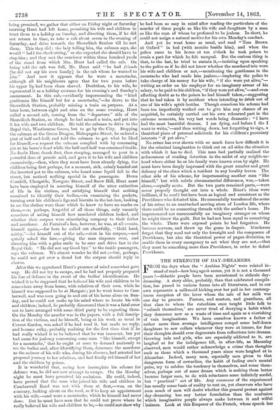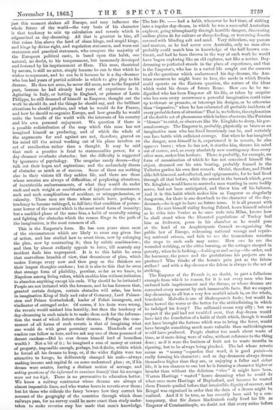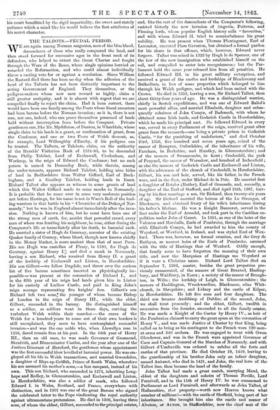THE STRENGTH OF DAY-DREAMERS,
EIROM the days when the " Arabian Nights" were related in- I. stead of read—how long ago it seems, yet it is not a thousand years !—didactic people have been accustomed to ridicule day- dreaming. A story older, probably, than that celebrated compila- tion, has passed in various forms into all literatures, and in our own represents a milkmaid kicking over her pail in her contemp- tuous reception of the lover whom the sale of her milk was one day to procure. Pastors, and masters, and guardians, all that class to whom the catechism once taught little folk to "submit themselves,' are never tired of decrying a habit which they denounce now as a waste of time and again as a cherishing of vain imaginations. We have ourselves known a father of rather more than average intelligence compel some half-dozen daughters to sew collars whenever they were at leisure, for fear their thoughts should ever degenerate from reflections into dreams. Growing lads and girls, who are especially addicted to it, are laughed at for the indulgence till, in after-life, as Macaulay observed, men would rather acknowledge a crime than thoughts such as those which a thousand years since were laughed at in Alnaschar. Indeed, many men, especially men given to that dangerous form of cowardice, the habit of feeling one's mental pulse, try to subdue the tendency in themselves, and rouse them- selves, perhaps out of some dream which is making them better because larger men, to do with reluctance some infinitely sordid, but " practical" act of life. Any consensus of the experienced has usually some basis of reality to rest on, yet observers who have seen much of men will doubt whether this general protest against day-dreaming has any better foundation than the confusion which imaginative people always make between it and wilful laziness. Look at this Emperor of the French, whose speech has
just this moment shaken all Europe, and may influence the whole future of the world—the very basis of his character is that tendency to mix up calculation and reverie which is stigmatized as day-dreaming. All that is greatest in him, all that raises him above the herd of sham kings, and stupid kings, and kings by divine right, and regulation statesmen, and worn-out statesmen and practical statesmen, who compose the majority of the European political caste, is based upon this habit, one natural, no doubt, to his temperament, but immensely developed and fostered by his imprisonment at Ham. This man, theatrical by nature, is still no actor, simply because he can be that which he wishes to represent, and he can be it because he is a day-dreamer who has had years of partial solitude in which to give play to his dreams. He does not seem, he never did seem, new to the Imperial part, because he had already had years of experience in it. Agitating in Italy, or betting in England, or prisoner of Louis Philippe, he still dreamed of himself as Emperor, thought out the work he should do, and the things he should say, and the brilliant situations he should produce, and what he would do for France, and how he should re-organize Europe, and how grandly he would unite the benefit of the world with the interests of his country and his own personal enjoyment. We question if there is a possible redistribution of the map which this man has not imagined himself as producing, and of which the whole of the arguments for and against are not, therefore, graved on his mind till the actual working out of his plans involves an act of recollection rather than a thought. It may be said that such a practice is fatal to statesmanlike power, for a day-dreamer overlooks obstacles; but the difficulty is suggested by ignorance of psychology. The sanguine rarely dream—they talk out their hopes and aspirations; and the melancholy dream of obstacles as much as of success. Some of them see nothing else in their visions till they sadden life, and there are those whose reveries are always of difficulties, of perplexing situations, of inextricable embarrassments, of what they would do under such and such weight or combination of injurious circumstances, such and such complications of accident, or misapprehension, or calamity. These men are those whose minds have, perhaps, a tendency to become unhinged, to fall into that condition of perma- nent horror of the unreal which is the most usual form of insanity; but a modified phase of the same bias, a habit of mentally raising and fighting the obstacles which the reason flings in the path of the imagination, is the most common of all.
This is the Emperor's form. He has seen years since most of the circumstances which are likely to cross any given line of action, and has studied how to avert them, now by enlarging the plan, now by contracting it; then by subtle combinations, and then by almost ruffianly appeals to force, till scarcely any incident finds him unprepared. It is to this habit he owes that marvellous breadth of view, that dreaminess of plan, which makes Europe every now and then gasp as the thinkers see their largest thoughts outdone ; but it is also to this that he owes that strange form of pliability, peculiar, so far as we know, to Napoleon among living rulers, which enables him without irritation to abandon anything except his ends. Why should he be irritated? People are not irritated with the foreseen, and he has foreseen that, granted certain designs, certain obstacles will arise, has been in imagination King of Italy and ruler of Germany, Lord Palmer- ston and Prince Gortachakoff, leader of Polish insurgents, and vindicator of outraged order. Of course, if his facts were wrong, the reverie would mislead him horribly, but then the tendency of -day-dreaming in such minds is to make them seek for the informa- tion the want of which fetters their dreams. Perhaps the com- monest of all forms of such reverie is that of imagining what one would do with great pecuniary means. Hundreds of our readers can follow us here, and we ask any one of them possessed of -decent candour—Did he ever dream himself lord of boundless wealth ? Not a bit of it ; he imagined a sum of money or extent of property, impossible enough, perhaps, but definite, within which he forced all his dreams to keep, or, if the wider flights were too attractive to forego, he deliberately changed his scale—always making income and capital fit on some understood plan ; or, if his dream were estates, having a distinct notion of acreage, and asking questions of the informed to convince himself that his averages were not too high. There is no provocative to education better. We know a railway contractor whose dreams are always of almost impossible lines, and who wastes hours in reverie over them; but let those who ridicule the fancy beware how they correct his account of the geography of the countries through which those railways pass, for no survey could be more exact than study under- taken to make reveries easy has made that man's knowledge.
The late Dr. — had a habit, whenever he had time, of sinking into a regular day-dream, in which he was a successful Australian explorer, going triumphantly through horrible dangers, discovering endless plains fit for culture or sheep-feeding, or traversing deserts covered with blinding salt and sand. Very ridiculous, say pastors and masters, as he had never seen Australia, only no Irian alive probably could match him in knowledge of the half-known con- tinent, and had he been thrown in the way of such work he would have begun exploring like an old explorer, not like a novice. Day- dreaming so perfected stands in the place of experience, and that is the Emperor's, who has in a varied life sought out the answers to all the questions which embarrassed his day-dreams, the Aus- trian resources he might have to face, the mode in which Russia could operate on the Eastern question, the nature of the ideas which resist his dream of future Rome. How can he be un- dignified who has been Emperor all his life, or taken by surprise who has seen every occurrence a powerful imagination could raise up to thwart or promote, or interrupt his designs, or be otherwise than "impassive," when he has exhausted all probable incidents of every probable form of situation? That is, we believe, the explanation of the double set of phenomena which induce observers like Parisian "blouses" to extol, or observers like Mr. Kinglake to decry, his per- sonal courage. The Emperor is, probably, physically as brave as an imaginative man who has lived luxuriously can be, and certainly can face battle with sufficient courage. But when he has imagined the danger, seen himself in it, experienced it in reverie, he also appears brave ; when he has not, it startles him, throws his mind out of course, and, as every absolutely new contingency does every other man, makes him hesitate. There is probably, for example, no form of assassination of which he has not conceived himself the object, dreamed out his own bearing, probably framed in the Tuileries garden his own first remark. Orsini, therefore, and Pietri alike left him cool, and collected, and epigrammatic, for he had lived through all that before, while the arrest in the barrack which, pace Mr. Iiinglake, would have re-assured a man wanting in mere bodily nerve, had not been anticipated, and threw him off his balance. And it is this habit which makes him as Emperor so singularly dangerous, for there is one drawback to the character of the day- dreamer,—he is apt to have no future tense. It is all present with him. He sees himself visibly freeing Poland, hears himself saluted as he rides into Venice as he once rode into Milan, knows how he shall stand when the liberated populations of Turkey hail him as Deliverer, poses in his chamber as he would pose at the head of an Amphictyonic Council re-organizing the public law of Europe, redressing national wrongs and repair- ing national crimes, and fails to see the tremendous miseries the steps to such ends may cause. How can he see the wounded writhing, or the cities burning, or the cottages steeped in poverty, when he is looking,—looking at and seeing—the order, and the harmony, the peace and the gratulations his projects are to produce? Who thinks of the heron's pain just as the falcon strikes ? and with a day-dreamer the falcon is always in the act of striking.
The Emperor of the French is, no doubt, in part a fallacious example from which to reason, for it is not every man who has endured both imprisonment and the throne, or whose dreams are corrected every moment by such immoveable facts. But we suspect day-dreaming to all but a very few morbid minds is, on the whole, beneficial. Malvolio is one of Shakespeare's fools ; but would he have bowed the worse or the better for the attitudinizing in which he indulged his fancy? The milkmaid seems very silly ; but we suspect if the pail had not tumbled over, that day-dream would have laid the foundation of a habit of thrift which, though it would not have brought the fortune which was to bring the lover, would have brought something much more valuable than unthinkingness would have produced. People chatter too much about waste of time, as if mere doing were of value, without reference to the thing done ; as if it were the business of fruit not to waste months in ripening, but to be always being plucked. The lad whose reverie seems so " moony "—pardon that word, it is good patois—is really forming his character ; and as day-dreamers always dream themselves higher than they are, or enjoying a fuller and richer life, it is ten chances to one but he is forming a character higher or broader than without the delicious " vice " it might have been.
Warren Hastings " wasted " hours dreaming what he would do when once more Hastings of Daylesford, and because he wasted them Francis quailed before that irresistible dignity of manner, and
Bengal was organized in order that the data of a dream might be realized. And if it be true, as has recently been said by a con- temporary, that Sir James Mackintosh really lived his life as Emperor of Constantinople, we doubt not that every suitor before
his court benefittei by the rigid impartiality, the sweet and stately patience which a mind like his would believe the first attributes of his secret character.
































 Previous page
Previous page